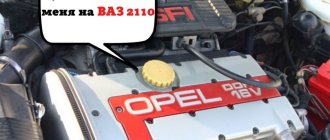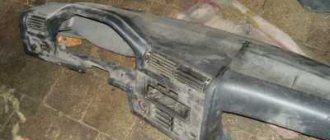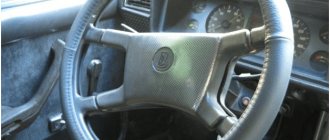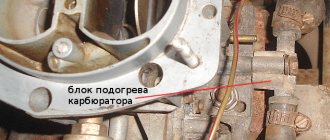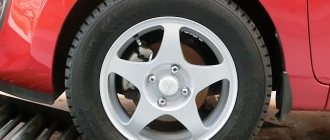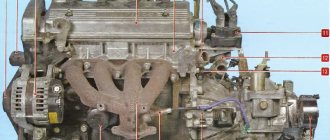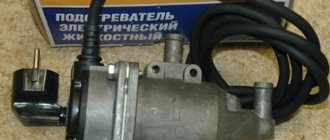The VAZ “Seven” is a luxury version of the LADA 2105 model and was produced for 30 years. One of the differences between the basic version of the VAZ 2107 and the prototype is a more powerful power unit with a volume of 1500 cc. cm, developing up to 77 horsepower. The car has undergone modifications more than once in its history, including being equipped with different engines. A natural question arises, which option is the best.
A total of 14 versions of the VAZ 2107 with carburetor and injection power units were produced. Their working volume varied from 1.3 liters to 1.7 liters, and their rated power ranged from 66 to 140 hp. respectively. The weakest engine, model 21034, for low-octane gasoline, was installed in a sedan, which can only be purchased in the People's Republic of China.
The special vehicle version 21079 was produced in small batches for the operational services of the Ministry of Internal Affairs and the State Security Committee. This machine was equipped with a two-section RPD - a rotary piston engine. With a modest working volume of 1300 cc. cm power unit developed power up to 140 hp, which made the ordinary-looking car very dynamic and capable of catching up with many foreign cars.
Engine replacement - do you need to register it with the traffic police?
Replacing the engine at the traffic police
On July 10, 2022, changes were made to Order No. 1001, according to which the engine became a registered unit among many motorists. And after October 7, 2022, this document completely lost force, and was replaced by updated Order No. 399, which also subsequently became ineffective. The Federal Law on Registration and the Decree of the Government of the Russian Federation No. 1764 issued in pursuance of it are now in force. And, if earlier the replacement of an engine required registration with the traffic police with documents about the released unit, then today, for 2022, after replacing - for example, a contract unit - such changes in the design generally need to be officially registered. But everything is not as difficult as you thought! If the model and technical characteristics of the motor are the same, then the matter is small.
Running in the updated engine
If, after installing the unit on the car, it was not possible to start it, it means that you need to tighten up the VAZ 2105 carburetor, adjusting the fuel flow of which does not provide a normal mixture for flash in the cylinder. It is also worth looking at the spark plugs and making sure there is a spark. Sometimes, for some unknown reason, the jets become clogged immediately after installation. With them, it's easy to just blow them out. The jets can also be cleaned with a special compound for carburetors.
The second reason why startup does not occur is that the camshaft marks are incorrectly set, the markings of which must correspond to the marks on the body. If the diagram shows that everything is set correctly, the issue may be fuel quality. You can try to start the car with a tow.
After starting the engine, it should be allowed to idle for some time. Why this is so necessary can be explained simply: the parts have not yet gotten used to each other. Even cast iron cylinders, whose markings correspond to the highest hardness, can fail due to improper running-in. If the VAZ 2105 engine gets hot, the fuel consumption of the VAZ should be increased.
After running-in, the fuel consumption of the VAZ must correspond to the passport data.
What engine can be installed on a VAZ 2107
To decide on an engine for a VAZ 2107 to replace the one that broke down, you need to understand how much money you can spend on installing a new engine. Answer yourself the question whether you need a powerful engine or a regular one will do.
Then check the following:
- Is it possible to mate a new engine with a gearbox on a car without modifications;
- Is the new engine compatible with other systems on the Zhiguli Seven?
Motors from other VAZ models
The VAZ 2107 can be equipped with engines from other Zhiguli or Lada models. For example, the engine from the Lada Niva sits on the cushions of the power unit of the seven without modifications. Power and volume correspond to the declared ones. It is a budget option for replacing the engine on a Zhiguli Seven.
Experienced mechanics say that the Niva’s engine is considered more modern than the engine from the 7. The Niva engine has hydraulic compensators, which means that the car owner no longer needs to independently set the thermal valve clearances. The power unit does not require complex and constant care, which is why it attracts young car enthusiasts.
Power units from Lada Priora increase the power of the car. Since the engine capacity of the Priora is 0.1 liters larger than the displacement of the standard 7 engine.
Despite the fact that the Lada engine has slightly different shapes, it is easily installed in place of the old engine.
Many experienced mechanics do not recommend installing a sixteen-valve engine. Since car owners will constantly have problems with it. The VAZ 2107 is simply not designed to operate on a 16-valve engine.
Engines from foreign cars
If you are not satisfied with domestic power units and want to replace the engine with a foreign one, then the following brands are suitable:
- Fiat or Nissan. They are easy to repair and maintain. They are similar to the power units from the seven and are identical in size to them. The engine conversion can be carried out in a garage by inviting a mechanic friend if you yourself do not understand the intricacies of reinstalling VAZ 2107 engines. Although there is nothing complicated about it. The only thing is not to make a mistake when choosing an adequately working engine;
- Volkswagen engine. It will add power to the car, but problems may arise due to a hole in the budget. The engine from a foreign car Volkswagen is too expensive. Although, if you set a goal for yourself, you will be able to save up not only for it.
There is a third type of engine for VAZ - rotary engines. Domestic cars love them the most.
Rotary engine
Such engines have the following parameters, which are more suitable for severe operating conditions of a vehicle on roads in Russia:
- maintains high engine speeds without overheating and harming the health of important engine components;
- torque without failure, as noted by experienced mechanics. This means that the car will not stall at both low and high speeds;
- It consumes fuel more than economically, unlike modern foreign engines.
However, rotary engines for VAZ have one drawback. They do not travel a large number of kilometers. For example, an engine that is suitable for installation on sevens will need 75 thousand kilometers and will need a major overhaul. This is the RPD 413 motor.
Therefore, for those who need stable and durable engines, it is better not to buy or install a rotary engine on a VAZ. You should try running a diesel engine. Let's see which diesel power units are suitable for the Russian VAZ 2107.
Diesel engines
Many car enthusiasts are trying to install a diesel engine from Fiat. Engine volume is 2.5 liters. This will play a cruel joke on the control of the car, since the power immediately increases several times. Now remember that it is better to buy a motor that is not only suitable in size, but also in volume.
A diesel engine from Fiat or Renault Logan is suitable for installation in the seven. Although experienced mechanics still advise installing a gasoline engine from Renault Logan. Since in volume it is identical to the seven or slightly larger.
In any case, whether you install a diesel engine in a car or a gasoline one, if you do not have experience in converting engines, then it is better to contact experienced mechanics. They will help you or carry out the replacement procedure themselves. And you will not suffer and spend money twice, first on remodeling, and then on treating car problems that could arise from improper installation of the power unit on the VAZ 2107.
The main difficulties when selecting a motor
After modifying the 2108 engine and turning it into a 16-valve 106-horsepower engine, it became possible to install it on the classic seven. This required some modifications both in the engine shield and in the mounting of the engine mounts. In engines from front-wheel drive VAZ cars, modification of the crankcase was necessary, since the standard crankcase from the Priorov engine could not be installed without the intervention of a welder; the crankcase rested on the front beam. The cooling system pipes, the starter and some electrical equipment also required modifications.
Many took the simple route. They simply installed a 1.7-liter Niva engine 21107, and it already had an injection system and hydraulic compensators installed. The engine was several horses more powerful, the exhaust, thanks to injection, became cleaner, and the engine’s response to fuel supply was brighter. Of course, an Alfa Romeo from a VAZ 2107 will never work, but in the pursuit of perfection, some even installed engines from foreign cars on the seven. Fortunately, there is enough of this stuff at the disassembly, the main thing is to choose a motor that is approximately suitable in size and configuration of the attachment. The diesel engine was not taken into consideration at all, since serious problems could arise with the documents.
But the biggest problem when replacing the 2107 engine with a non-original one was connecting the transmission to the engine. To do this, it was necessary to integrate the gearbox shaft bearing into the flywheel, since the design of the gearbox of front-wheel drive vehicles did not provide for high loads on the gearbox drive shaft. It is possible that there was some gain when installing a different engine on the VAZ 2107, but problems with passing technical inspection became decisive for many when searching for the most powerful and modern car.
A slight addition of power to a few horses, efficiency and higher dynamics could not overcome all the shortcomings of installing modern engines on the seven, so for us it will forever remain the same seven that was the most luxurious mass-produced car in the country of the Soviets.
We change VAZ to VAZ
But time passed and VAZ appeared new engines and systems that could be attached to the old classic engines. First of all, this concerns the injection system. An injection engine, or more precisely, a classic carburetor engine from the 7 with an injector, was also installed as standard. In addition to the injection system itself, such an engine was equipped with a hydraulic compensator system, a catalyst and a hydraulic chain tensioning system, if it was a 2103 engine.
However, the not entirely correct use of newer systems has brought some inconvenience. Since the organization of the engine compartment did not initially include an injection system, its installation made servicing the engine inconvenient. The catalyst was especially hard on the car, as it reduced the ground clearance by several centimeters. And on our roads this often led to damage to the exhaust system. In addition, drivers were accustomed to diagnosing and tuning carburetor engines on their own, but these things no longer worked with an injector. Here we needed computer diagnostics, which not everyone could or wanted to afford.
VAZ-2112 / 21126
In-line naturally aspirated four, volume 1.5-1.8 liters
Advantages: large selection of engines, low cost, abundance of solutions for modification, well known to Russian mechanics
The words “Shesnar”, “prioromotor” are like the password “friend or foe” for tuning lovers. Swap of this engine is truly popular entertainment. Yes, the design of the VAZ 16-valve engine is not a masterpiece: the displacement is too small and you can’t really increase it without losing reliability, the block is too weak for boosting the speed, and the characteristics of the head could be better.
But there are an extremely large number of these motors, and you can buy them for a little more than scrap metal! Firms from Togliatti and other parts of our homeland have long established the production of a huge amount of sports “hardware” for the VAZ engine: camshafts and crankshafts, forged pistons, connecting rods, intake and exhaust systems, modified heads, turbo kits... Some extreme sports enthusiasts manage to remove about 200 horsepower. And with a turbocharger, even 500 horsepower is not the limit - such engines are prepared for drag racing, where a bright but short life awaits them.
The VAZ “Shesnar” is the first candidate for installation under the hood of a Lada or Niva, since it fits perfectly with the “classic” gearbox. But the options don't end there. It’s better for you not to know where else it was installed - for example, in Zaporozhets or in the Mazda RX-8!
Source
Criterias of choice
When deciding whether to retrofit a vehicle, there are a number of important points to take into account. The list of requirements that the engine for the VAZ 2107 must satisfy is as follows:
- Compliance with the standard power unit in terms of overall dimensions and weight characteristics.
- Possibility of docking with vehicle transmission units.
- Compatibility of the power plant with other vehicle systems.
The closest technical characteristics to the power unit of the “seven” are the products of such companies as Nissan and Fiat. Their motors can be used with minimal modifications.
You can purchase a suitable engine at a disassembly site for relatively little money. Before installing it on your VAZ 2107, it makes sense to diagnose it and, if necessary, make major repairs. Practice shows that replacement of some parts: oil seals, belts and other components is mandatory. Doing this by car is more difficult and troublesome.
Where is the engine number
Each vehicle model produced at the factory is equipped with an engine with a personal number. So, the engine number on the “seven” is its identification number, which can be used to determine the identity of the stolen car and its history.
The engine number is stamped on the cylinder block on the left side, immediately below the distributor. In addition, the number is duplicated in the summary table, which is attached below the air supply housing. The metal plate contains information about the car, such as model, body number, model and number of the engine unit, equipment, etc.
Installation overview
When all the preparatory work is completed, you can install the engine from the Priora into the engine compartment of the Lada Niva. The entire process, if you have the necessary tools and equipment, will take specialists no more than one day; performing such a procedure on your own is more difficult and longer.
Connecting the unit to the gearbox will not cause any problems; assembly and modification of the exhaust and cooling systems will take more time. An old exhaust manifold from a VAZ 2107 or Niva will not fit on a Priora engine. The easiest way is to make it using the same gas welding machine or order this part; it is difficult to purchase a finished product.
The same applies to the engine cooling system. Since it is impossible to connect the cylinder block, thermostat and radiator with old pipes, car enthusiasts make pipes themselves or with the help of craftsmen at their own discretion.
If your VAZ 2107 car was equipped with a fuel injection system, then further assembly and connection of electronic control systems will not be very difficult. Various nuances may arise that will need to be addressed during the installation process. If the fuel was supplied using a carburetor, then you will need to tinker with the electronics, install a cable drive for the gas pedal, a remote fuel pump and filter, and organize a return fuel line.
You will have to deal with all these nuances when installing the Priora engine on a VAZ 2106; in many issues you will need advice or help from specialists. Nevertheless, the modern powerful engine from the VAZ 2170 will definitely breathe new life into your legendary classic Zhiguli model.
Differences between cars of recent years [edit | edit code]
In cars of the last years of production (under the state car recycling program), in order to minimize the selling price, the maximum cost of elements was made relative to previously produced equipment. What we noticed: there are no ashtrays in the rear door trim; interior door handles are made of molded hard plastic (instead of rubberized material); There are no clothes hooks on the ceiling handrails; one weak and capricious sound signal “tablet” was used, instead of two “horns”. The 2010 car was not equipped with a pump. In addition, changes affected the appearance of the “seven”. Instead of a flat trunk lid, a lid with stamping from a VAZ-2105 appeared, and the plastic molding at the bottom of the body disappeared. They refused to paint the door pillars and frames black, and they abandoned the chrome-plated external door handles. Headlight washers and cleaners were no longer installed on cars of recent years of production.
VAZ 2107 is a five-seater passenger car of a classic layout with a front longitudinal arrangement of the power unit and rear drive wheels. The engine is a four-cylinder, four-stroke, eight-valve, in-line, carburetor or fuel injection system. The body is a supporting structure, all-metal, welded. Body type – sedan.
Overall dimensions of VAZ 2107
The VAZ 2107 car is equipped with a carburetor engine of the VAZ 2103 model with a working volume of 1.5 liters. The modification of the VAZ 21074 car is distinguished by the engine of the VAZ 2106 model with a displacement of 1.6 liters.
In recent years of production of this model, modifications of the VAZ 2107-20 car with a VAZ 2104 engine with a displacement of 1.5 liters and VAZ 21074-20 with a VAZ 21067 engine with a displacement of 1.6 liters, equipped with fuel injection, mechanical part (cylinder block, connecting rod) were produced -piston group, crankshaft) of these engines are respectively identical to the VAZ 2103 and VAZ 2106 engines. The VAZ 2104 and VAZ 21067 engines are equipped with more powerful generators and starters with planetary gearboxes. The installation of engines with distributed fuel injection in cars, as well as the use of a gasoline vapor recovery system and catalytic converters in exhaust systems, made it possible to reduce the toxicity of exhaust gases and fuel consumption, and increase the reliability of engine starting in cold weather. The body, chassis and transmission remained unchanged.
Predecessor – VAZ 2105, successor – Lada Granta.
The procedure for registering an engine replacement at the traffic police
Thus, the instructions for registering with the traffic police for replacing a contract or any other engine look very simple and consist of only 2 points:
1. You change the engine itself at a service center.
2. After installing a new engine, you do not need to go anywhere and make changes to the documents in the MREO of the State Traffic Safety Inspectorate, as well as make changes to the PTS. Such changes will be made to the vehicle passport, as well as in the traffic police database itself, during any subsequent registry, when the engine replacement mark is put in the passport. The cost of making changes to the PTS for 2022 is only 350 rubles (245 rubles through State Services), which will be required to pay the state duty. It will need to be paid before going to the traffic police.
But the vehicle registration certificate will not have to be changed, because the engine number has recently not been entered into this registration document.
If the motor is contract
But if we are talking about a contract engine imported from abroad, then after such a replacement the traffic police may require a customs declaration confirming the legality of importing such a motor into the territory of the Russian Federation. Such a requirement is illegal, but is often practiced in traffic police registration offices.
If one is required of you, then your goal is to receive a written refusal (after writing a written statement, of course), and then go to court to solve this problem.
But there is practically no judicial practice on such decisions. That is why the MREO of the State Traffic Safety Inspectorate today can put forward a variety of demands on the issue of engine replacement - from illegal to absurd, and not only regarding contract engines.
We also suggest that you read our special article on replacing the engine with a more powerful one or with other technical characteristics. In such cases, you will need to go through the entire formal process of officially making changes to the design of the car.
Major renovation
As an alternative replacement option, you can consider major repairs or tuning.
Repairing your original engine will allow you to save a lot of money. And as a result, you will receive a unit that will be in no way inferior to the new engine you purchased. If it is necessary to increase power, it is enough to install larger cylinders and bore the block. You can also increase the compression and install a turbine. Such tuning will make your car a real “beast”. To extend the life of the power plant, you need to install high-quality parts and use good quality oil. The easiest way to increase power is to bore the power plant by 3 mm for an 82 mm piston. To get a more torquey engine and to further increase the volume to 1.8 liters, you will have to increase the piston stroke to 84 mm.
One of the advantages of repair and tuning is that there is no need to re-register the car. You can spend the saved money, for example, on improving the braking system, increasing comfort, etc. You don’t have to do all this yourself. Even if you use the services of a car service, it will cost less than buying and installing a new engine.
Re-equipping a car on your own: is it possible?
From the above description it is clear that the VAZ 2107 can be equipped with any engine from 14 VAZ models. This can be done without any special modifications, except that some difficulties may arise with the RPD. However, this power unit is compact and there is enough space in the engine compartment for it. Another thing is that it is quite difficult to find and there are big problems with spare parts.
Tuning enthusiasts are not limited to such simple options and prefer more complex tasks. It is considered especially chic for such car owners to replace the standard engine with a powerful engine from a foreign car. Theoretically, there is nothing technically impossible about this and it can be done subject to certain conditions. In the matter of selecting a suitable power unit, it is advisable to consult with specialists and study successful experience.
Installing the 2108 engine on a classic
First, we need to free the engine compartment of our car from everything unnecessary, namely from the old engine; from it we only need the starter and the mounting brackets for the engine mounts. After this, we can move on to our new heart, and first we will have to disassemble it a little and remove the crankshaft from it in order to press the support bearing of the input shaft 2101 into it as much as the original one sticks out, it must be cut off and the bearing pressed in its place. A turner will help you with this for a small price. This drawing can also help you with this. After that we put our crankshaft back. At the same time, you can immediately grab the flywheel to sharpen it under the classic crown for pressing. The turning work is done, now we need to rearrange the brackets from our old motor; there are special holes on the side of the figure-eight block. Then you will need to slightly knead the engine shield, just as in the case of a 16 valve engine. We put a flywheel on the engine with a crown already pressed onto it, and attach a classic clutch basket to it.
Engine cooling system.
You should start with the rear thermostat, as you probably already understood that you will have to make the entire cooling system yourself. It needs to be made at a maximum angle to the side so that it does not rest against the engine shield. This is roughly what it will look like, this one is made from an old eight-point thermostat, if you want you can make a metal one, it’s up to you. After this, you can put the motor in its place, having first replaced the old pillows with new ones; I recommend using pillows from the Niva. To ensure that your oil pan does not touch the lower beam, I recommend placing a thick washer on each pad; with this you can win a few precious mm. When the motor is in place, you can continue with the cooling system; you will need to make pipes like this. This is how they will look on the car. The thermostat is a classic one. With the cooling system, I think I have more or less clarified the picture for you, of course it will not be possible to describe everything, but I told you the main thing.
Final work on installing the VAZ 2108 engine.
After all the above work, all you have to do is lay the return line, install a classic starter, run the wiring, and also make the exhaust manifold yourself, connect everything after that, you can try to start it. I want to say that the process is not easy, you will have to spend a decent amount of your time, effort and money, that’s all, good luck in your endeavors, if you have questions, write in the comments.
Also read other interesting articles about how to build a cramp yourself on our website and join our VKontakte group.
Connoisseurs of the history of the domestic automotive industry know that the VAZ 2107 is a “luxury” version of the old VAZ 2105 model. A significant difference between the “Seven” and the prototype is its engine, which is more powerful and reliable. The engine was repeatedly modified and adjusted, and the model of different generations was equipped with different types of motors.
Refinement of the power system
In order for the VAZ 21053 to drive perfectly, it is quite easy to look after the air filter and clean the carburetor from time to time. But the factory design can be slightly modified. Probably, when doing engine repairs, many noticed that the pistons of cylinders 2 and 3 are dark, and pistons 1 and 4 are light. This indicates that some cylinders are receiving a rich mixture, while others are receiving a lean mixture. This problem is solved by installing two carburetors, the jets of which will distribute the mixture in equal proportions.
16 valve engine for classic 2105
The old engine from the classics could not withstand the pressure))) and rattled, we decided to install
16 valve injection engine...
VAZ with an engine from a BMW M3! turbo cramp 450 HP
VAZ
with
an engine
from a BMW M3! turbo cramps 450 HP.
It is best to use Weber modifications; in this case, adjusting fuel consumption for each VAZ 2105 carburetor is not so difficult. Well, Weber’s reliability is better. To install it, you will need a set of plumbing tools, tees, hoses and manifolds from Oka, the markings of which are in the catalog. At the same time, it is worth keeping in mind that it can be very difficult to achieve synchronous operation of carburetors. And why this happens is hard to say. Most likely, each VAZ 2105 carburetor is unique, and therefore the adjustment of fuel consumption does not turn out flawless. So two carburetors are a very big risk. Although if everything can be set up synchronously, then the VAZ’s internal combustion engine will begin to operate very smoothly. And the fuel consumption of the VAZ will increase, but by less than 1 liter.
After installing two carburetors, you will also have to make air filters. They are usually made from materials at hand. You can also install a zero resistance filter. If the Federal Tax Service is installed on a VAZ 2105 carburetor, additional adjustment of fuel consumption . However, it is worth remembering that such a filtration device must be constantly maintained, otherwise the engine life will be significantly reduced due to the ingress of abrasive particles. If you forget about the VAZ 2105 carburetor, then adjusting the fuel consumption can lead to the mixture in the engine becoming lean. By the way, if it is not clear why engine , then it is quite possible that it is because the mixture is too lean.
Considering the problematic carburetor of the VAZ 2105, the adjustment of fuel consumption of which takes a lot of time, it makes sense to switch to an injector. To do this, it is better to buy all spare parts at the official VAZ center. There is a special diagram for installation; all the work can be done in a couple of days in the garage. After this, you can forever forget about the VAZ 2105 carburetor, the adjustment of fuel consumption of which was so exhausting. However, the injector may also require initial setup.
Which imported engine should you prefer?
Now let's move on to the main question - what engine can be installed on the VAZ 2114? Answering this question, I would like to remind you once again - you should choose only the one that can be installed without modifications or with a minimum number of them.
These imported engines include engines from:
- AUDI-80;
- BYD F3;
- Alfa Romeo;
- Chery Amulet;
- Chevrolet Aveo;
- Ford Focus;
- Fiat Bravo;
- Geely CK2;
- Geely MK1;
- Honda Civic;
- Daewoo Lanos;
- Opel Astra;
- Hyundai Accent;
- Opel Corsa;
- Opel Astra Kadett;
- Opel Astra Vectra B;
- Seat Ibiza;
- Mazda 323;
- Mazda 626;
- Peugeot 205;
- Peugeot 405;
- Toyota Supra;
- Renault Logan;
- Volkswagen Golf;
- Volkswagen Jetta.
All of the listed engines can be installed on the 14th VAZ with a minimum of alterations to other mechanisms, in most cases - without any alterations at all. This will help save not only effort and money for additional work on replacing units, but can also save a lot of nerves when registering a car with the road inspection (although registering such a tuned car will still be a very big problem).
That is why, before deciding which engine is suitable for a VAZ 2114 from a foreign car, it is better to think again about tuning an existing, original engine. There are quite a few ways to increase its power and service life without replacing it with another, and all of them are completely legal from the point of view of the law.
Read more: Government resolution on replacement
Tuning is not just about changing the appearance of a car, as many people think. In fact, revisions often concern the technical component. Someone makes changes to the exhaust system, changes elements of the factory engine.
But there is a more drastic, expensive and interesting option - change the engine. With the new engine you get different technical characteristics, increased power, increased maximum speed, better acceleration.
What's under your hood?
Replacing a motor is a fairly serious step that requires thinking through every stage, from choosing a new motor to the consequences that such work may result in.
How to install a 16-valve engine on a VAZ 2107
To begin with, you should be well prepared for the procedure:
- enlist the help of two people in advance or connect a hoist to move a heavy motor into the engine compartment;
- dismantle the old engine and all attachments;
- prepare a complete set of wrenches and screwdrivers;
- prepare a hammer and pliers;
- find a good turner to bore the flywheel (on a new engine you will need to remove the flywheel and grind its crown from the inside - this is the only way to ensure free entry of the starter element into the clutch with the flywheel);
Work process
If you are installing an engine from a VAZ 2112 or Lada Priora, then you will not need to change the clutch basket, since the new engine will feel quite comfortable with the old clutch.
After completing all the preparatory work, the actual installation of the 16-valve engine on the “seven” follows:
- Install Niva engine mounts in the engine compartment.
Necessary improvements
However, the installation of a 16-valve engine does not end there. A number of works will be required to improve the entire system. And the best place to start is with electrics.
Electrical refurbishment
For high-quality operation of the new power unit, you will have to replace the gasoline pump. You can take this mechanism from both the Priora and the Twelfth, or you can save money and buy a pump from the injection model of the Seven. The fuel pump is connected according to the usual algorithm and does not require any modifications.
On the VAZ 2107, the motor is connected with only three wires. The new engine requires a qualitatively different connection. First of all, you will need to complete the following steps:
- Install the engine control unit (for example, from the VAZ 2112 model).
- Connect all the sensors included in the kit to it - the wires should be pulled along the same places where they are stretched on the VAZ 2107 (in some cases, the standard wiring will need to be extended).
Brake system
The new motor has higher power characteristics, which means that the car will accelerate faster and brake slower. In this regard, it is recommended to modify the braking system on the VAZ 2107. To do this, it is enough to replace the main cylinder with a more powerful one, and also, if necessary, replace all the cylinders if they are badly worn.
Cooling system
As a rule, the available potential of the standard cooling system on the “seven” is enough to promptly cool the new powerful engine. However, if the engine lacks cooling, a small modification will be required: fill the expansion tank not with antifreeze, but with a higher quality antifreeze.
Thus, installing a 16-valve engine on a VAZ 2107 is a complex procedure, as it requires not only significant physical effort, but also thoughtful action. The main difficulty of this operation is connecting the wiring and modifying the system.
How to dismantle an old engine
After you have carried out diagnostics and other preparatory work, you can begin to dismantle the factory unit. This is done like this:
- The car must be installed in a garage box on a lift or inspection pit.
- Then you need to disconnect the battery and remove it from the car. All attachments are also turned off and dismantled.
- Then you need to remove the power unit from the transmission and unfasten the mounting bolts.
- Next, using the hoist, you can begin to remove the motor. It is advisable to put the removed device on a stand and subsequently sell it. This will partially offset the cost of a new engine.
After all this work, you can proceed directly to installing the new engine.
As we have already found out, the best engines are products from Nissan and Fiat. Also, many people prefer BMW, Lancia or Volkswagen products. In order to install the engine correctly, you need to follow a clear sequence of actions. You can’t do this without the help of specialists. To be more specific, you need to call a welder who will perform the relevant work. You can independently secure all the necessary mechanisms and systems. All installation work must be carried out strictly according to the instructions, since one wrong action can lead to
that after installation the engine will not start.
What should you prepare?
First of all, of course, the new engine itself. In the case when a used motor is purchased (as most often happens), there is no doubt about the need to disassemble and inspect it, so that you do not have to do this later and disassemble everything again. This approach provides one more advantage: if you decide to make the transitional fastening parts that are needed to install the 21126 engine in the body of a Niva or classic on your own, then in disassembled form it is easier to try on the cylinder block in place and find out the dimensions of the parts.
It is better to perform this operation with the oil pan screwed on, because it also requires modification. The Priorovsky pallet simply rests against the cross beam of the VAZ 21213 Niva; it needs to be carefully straightened, trying it on in place. The refractory steel from which the latter is stamped allows such modifications to be made to it. Here are general recommendations for performing preparatory work:
- First you need to remove the flywheel from the newly installed motor and remove the old crown from it. Its teeth will not coincide with the classic starter gear, so you need to purchase a suitable ring and install it on the flywheel.
- Since only the unit itself changes, and the Lada Niva or 2107 gearbox remains in place, you need to properly connect these two units. Ideally, this is done using an adapter plate, which can be ordered from a milling machine or purchased ready-made; everyone decides for themselves what to do. One of these solutions is not to install an adapter plate at all, and mount the Priora cylinder block directly to the classic. In this case, one hole on the mounting flange of the block will remain without a bolt and the units will be attached to each other using three connections instead of four. This cannot be said to be a wrong decision. Car enthusiasts who have not installed the adapter plate confirm that the three-bolt units are held very securely.
- Since the newly installed engine will be somewhat recessed towards the car's interior, you will have to cut out a small part of the metal partition that separates the Lada Niva engine compartment from the interior. It is recommended to do this using a gas torch, carefully so as not to cut out excess, since this partition is the rigidity of the body. Some craftsmen use an angle grinder, but this is associated with inconvenience.
- At the end of the crankshaft of the 21126 engine, it is necessary to install a support bearing, which is present on all classic Zhiguli models, but is not present on front-wheel drive cars. The fact is that in the same VAZ 21213 Niva the rear crankshaft bearing is a support for the input shaft of the gearbox. Therefore, you will have to turn to a turner on this issue, who will help you grind the end and install the bearing. Considering the great similarity of the nodes, this will not take much time.
- For the landing pads for the power unit, you need to prepare adapter plates with holes.
- If your Lada Niva or S7 car had a fuel system with a carburetor, then you will have to worry about purchasing a remote electric fuel pump, a cable drive for the gas pedal and a fuel filter. The pump can be taken from the injection Volga.
- You should prepare a special adapter for the clutch.
1 — bracket for mounting the generator and the front support of the power unit; 2 - generator; 3 — generator drive belt; 4 — bracket for the upper mounting of the generator; 5 — bracket for the right support of the power unit; 6 - phase sensor; 7 — front upper timing cover; 8 — rear timing drive cover; 9 — inlet pipeline; 10 — ignition coil; 11 — throttle assembly; 12 — oil filler cap; 13 — cylinder head cover; 14 — low oil pressure indicator sensor; 15 — camshaft bearing housing; 16 — cylinder head; 17 — thermostat housing; 18 — thermostat cover; 19 — supply pipe of the coolant pump; 20 — oil level indicator in the gearbox; 21 — bracket for the left support of the power unit; 22 — gearbox; 23 — starter; 24 — coolant drain plug; 25 — crankcase ventilation hose; 26 — knock sensor; 27 — oil pan; 28 — oil level indicator; 29 - cylinder block
Is tuning needed for VAZ 2105
There are known craftsmen in Russia who have squeezed 200 hp out of a VAZ 2105 engine running on gasoline. With. and raised technical properties to record levels. But why doesn’t everyone decide to do such tuning? Practice indicates that such modifications do not make any sense, since wasting large amounts of money to the detriment of one’s safety is simply stupid. The most reasonable modernization of the VAZ 2105 engine should be limited to a slight increase in power and a maximum increase in reliability. You can, for example, increase the volume of the engine slightly by boring it out for 82-mm pistons from the Niva. You can slightly increase the engine power by installing a different camshaft and boring the cylinder head. But you need to realize that the design of the VAZ 21053 is archaic, and there is no particular point in its radical modernization.
Great Wall 491QE engine - technical characteristics of the power unit
Great Wall 491QE is an atmospheric internal combustion engine with a volume of 2.2 liter working chambers, the power potential of which reaches 105 horsepower with a torque of 190 N*m. The engine architecture implies an in-line arrangement of 4 cylinders without additional injection equipment.
| engine's type | In-line, 4-cylinder |
| Construction diagram (cylinder operating order) | 1-3-4-2 |
| Cylinder diameter, mm | 91 |
| Number of valves | 8 |
| Piston stroke, mm | 86 |
| cylinder head | Aluminum |
| Nutrition | Distributed injection |
| Engine capacity, cubic meters cm | 2237 |
| Power potential, l s | 105 |
| Power potential, kW at rev. /min | 77 |
| Maximum torque, N*m (kg*m) at rev. /min. | 190 (19) / 2800 |
| 190 (19) / 3200 | |
| Compression ratio | 8.8 — 9.1 |
| Fuel consumption, l/100 km | 12 — 15 |
| Recommended fuel type | Gasoline AI-92 |
| Environmental standards | EURO-2 and EURO-3 |
The power unit operates stably only on AI-92 class fuel, and the average consumption per 100 km is up to 15 liters in urban conditions and from 9.5 on the highway or highway
It is also important to note the engine’s requirement for the recommended type of fuel - filling the car’s gas tank with gasoline with an octane rating higher or lower than required can result in overheating of the power unit and possible “triple” of the cylinders. The engine complies with EURO-2 and EURO-3 emission standards, and therefore cannot be used in every European country
The average consumption of technical fluids of a power unit is 700 grams per 1000 km, while a comprehensive oil change must be carried out after 7000 km. The volume of oil pipes in the Great Wall 491QE engine is 4.5 liters.
The average service life does not exceed 500-550,000 km. The manufacturing company was able to achieve this result thanks to the introduction of additional valves to the power plant, as a result of which, while maintaining the factory thrust parameters of the Toyota 4Y engine, it was possible to reduce the number of piston revolutions per minute in the Chinese equivalent. In fact, this solution is a distinctive element that modifies the design of the engine, however, in practice, most components for engines from the Japanese and Chinese auto industries are interchangeable.
The design of the Great Wall 491QE power unit also provides for the possibility of a major overhaul, which will increase the service life of the engine by approximately another 300,000 km. The VIN number of the engine unit is stamped either in the center of the crankcase cover or on the front sides of the power unit and is often covered with a protective metal plate.
Instead of a heart: the history of the Zhiguli engine from the VAZ-2101 to the present day
It’s hard to believe, but for almost 45 years AvtoVAZ has been using engines that trace their pedigree to the “kopek”. Soon the era of “classic” engines will come to an end, and we will track the process of their evolution.
When talking about engines from the 70s, the first thing that comes to mind is the “classics” themselves - VAZ-2104, 05 and 07. But the last batches of these models have long been sold. What remains?
The last carriers of the first generation engines are the “relatives” of the Lada 4×4 and Chevrolet Niva. But the first, according to preliminary data, will receive a boost to 90 hp during the update. the engine is from Priora, and the second, when the generation changes, will acquire a 135-horsepower engine under the Peugeot-Citroen brand.
Spear tip
It is generally accepted that the VAZ-2101 is a Fiat 124 localized in the Soviet Union, but this is not entirely true. The cars look very similar, but more than 800 key changes were made to the design before the Fiatic became a penny. And, perhaps, the most important thing that happened along the way was an engine change. At the insistence of the VAZ team, the Fiat-124 engine, which had a rather archaic design even at that time with a lower camshaft, was turned into an overhead camshaft.
In addition, while maintaining a working volume of 1.2 liters, the cylinder diameter increased from 73 to 76 mm, and the piston stroke decreased from 71.5 to 66 mm, as a result of which the engine turned from a long-stroke to a short-stroke, and therefore became more revving and “responsive” " It was the move of the camshaft up that made it possible to increase the speed - the engine became a little noisier, but also more compact, simple, and economical.
According to one version, Fiat carried out this metamorphosis with the help of a subsidiary Italian tuning center, according to another - in collaboration with specialists from VAZ itself. Be that as it may, the engine turned out fine. If we compare it in terms of power, then it has not become fundamentally higher, but if you believe one of the VAZ legends, the Italians liked the characteristics of this engine so much (acceleration response, efficiency, simplicity of design, maintainability, service life) that they very quickly began to replicate the resulting solution on of its products.
A legend is a legend, and the very next after the “one hundred and twenty-fourth” Fiat 131 had an engine with an overhead camshaft, that is, a design first used by Fiat on the Soviet “kopek” and which has now become generally accepted. Well, the VAZ-2101 engine, coupled with an improved transmission (increased clutch, modified synchronizers, modified cardan, new rear axle), reinforced front suspension and a completely replaced rear, more rigid body, as well as a number of other “adaptation” measures, served as the basis for the first VAZ model and laid down the architecture of the Zhiguli model range for many years to come.
Other engine modifications: intake and exhaust
If you take into account the recommendations of experts, in order for the engine to turn out to be resourceful, you should not strive to increase its volume beyond the 1.6 liter mark. An increase in volume above this figure will mean that the engine becomes “heavier” and spins less intensively.
As for modifications, special attention should be paid not only to the block, but also to the cylinder head. Refinement involves grinding the cylinder head channels through which fuel flows from the intake manifold
It is important to achieve not only a larger channel cross-section, but also a smooth transition, and also that all channels end up being the same.
The next step will be to upgrade the exhaust ports and valves. The channels are polished and the valves can even be replaced. For example, a suitable option is selected (it can also be from a foreign car), after which the valve stems are processed to the dimensions for a VAZ engine.
The valve plates should also be processed at the same time.
It is important to adjust all valves according to weight. Separately, it is worth approaching the issue of installing the camshaft
In order for the engine to pull well from the bottom and at high speeds, it is optimal to select a camshaft that provides high valve lift. At the same time, a split gear is also required for precise adjustment of the valve timing.
The complexity of modifications to the VAZ 2105
It is even more difficult to increase power in a VAZ 2105 with a belt engine than, for example, in a VAZ 21053. For example, when using a “humpbacked” camshaft, you will need to install a split drive gear. But it simply doesn’t exist for the “five” engine with a belt; it’s impossible to set marks. It would be better then to completely change the engine, for example, install a 2105 diesel, or purchase a kit for conversion to an injector. Still, of all types of VAZ fuel, diesel fuel is the most affordable. And the injector, although gasoline, will also reduce fuel consumption, because its design is such that the jets are controlled electronically.
The deepest tuning of a VAZ engine should be carried out only for some creative reasons. Light modifications to the VAZ 2105 can be done with your own hands without spending a lot of money. For example, if the engine of a VAZ 2105 , it is completely possible to modify the power system. And, in addition, reduce fuel consumption for the VAZ.
Before work, you should carefully read the advice, draw up an approximate tuning budget and an estimate of parts, familiarize yourself with where the markings and marks are on the parts. It often turns out that the set aside funds are not enough. Why this happens is something everyone can probably figure out. When disassembling the car, it turns out that it is necessary not only to modify the engine, but also, for example, to make a complete repair of the load-bearing parts of the body. Also, before work, a diagram or repair book will be useful. Despite the fact that the markings of different Zhiguli units are different, the literature can be used from various modifications.
